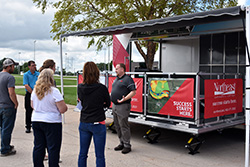The Precision Agriculture Learning (PAL) simulator is outfitted with multiple hands-on mobile training modules to train current and future producers. The simulator is an integral part of a three-year, $785,000 grant awarded to the College by the National Science Foundation. Northeast purchased a trailer to transport the PAL simulator and its modules to educational trainings and events across the College’s 20-county service area.
“The National Science Foundation grant is funding provided by the federal government that allows a relationship to be built between agriculture and hands-on demonstration and training,” said Corinne Morris, dean of Agriculture, Math and Science at Northeast.
Morris said the grant focuses on three areas: college education, industry training and high school education.
First, Northeast will consult with those in the local agriculture industry to integrate the PAL simulator into the Associate of Applied Science precision agriculture curriculum, which will allow students to use the simulator to engage in realistic farm scenarios.
“College instructors will be able to provide real-world examples using data archives gathered from Northeast Community College farm operations to show the relationships between annual environmental impacts, field characteristics and the results from the management decisions made based on those pieces of data,” Morris said. “This allows students to see data in action in an environment similar to what they may experience on their own operations.”
These lessons will also serve as the foundation for a series of credit-eligible workshops and hybrid courses, offered through the College’s Center for Enterprise (CFE), that will allow those currently employed in agricultural-based businesses and industries to enhance their skills and productivity.
“The simulation units will be utilized to train workers across Northeast’s 20-county service area,” said Eric Johnson, associate vice president of the CFE at Northeast. “Utilizing cutting edge equipment, producers can update current skills or learn new skills as industry trends continue to evolve.”
The PAL simulator course material will also be integrated into precision agriculture curriculum that will modernize the current Nebraska high school introductory agriculture course. The simulator will visit participating schools in Northeast’s 20-county service area as part of the learning experience, which will be facilitated by Northeast faculty and students.
Lonny Mitchell, precision agriculture trainer at Northeast, has been working with area high school teachers to develop the course material.
“Each school that is currently involved in this is completely different from the next, whether the difference is socioeconomic, or the type and amount of agriculture taught at the school. It’s great to have that cross-sectioning of schools so we’re able to make this curriculum as applicable to as many students as possible.”
Mitchell said the PAL simulator includes several pieces of equipment to maximize learning. They include a two-row precision planter that can change between hybrids or varieties with ease and a sprayer that can apply variable rate applications. Because of water quality and availability issues facing northeast Nebraska, the equipment also includes soil moisture probes, which can help producers reduce the amount of water that is applied to a crop each year, thus saving money and resources while reducing the leaching of chemicals due to over-application.
According to projections from the Bureau of Labor Statistics, the precision agriculture field is growing. Technicians will be needed to fulfill a rising demand in fields that require proficiency in precision ag technologies, including agriculture, food science, environmental science, farm equipment mechanics, land surveying and others.
“There are an amazing number of jobs out there that deal with this technology,” Mitchell said. “They range from production agriculture, to being a mechanic, or working in equipment development, to state and county workers who use precision equipment for maintaining roads. There’s a lot you can do with it. You don’t have to be a farmer in order to utilize precision technology.”
Morris said the PAL simulator will impact the agriculture industry in a variety of ways.
“It allows innovative training to companies through customized training opportunities tailored to each company’s needs. At the high school and college levels, the simulator introduces a passion for agriculture and innovative technology to faculty and students. And providing hands-on training and collaboration outside of the classroom offers students a closer connection to potential careers in agriculture.”
This material is based upon work supported by the National Science Foundation under Grant No. 1700680. Any opinions, findings, and conclusions or recommendations expressed in this material are those of the author and do not necessarily reflect the views of the National Science Foundation.
--###--
PHOTO CUTLINE
Lonny Mitchell (right), precision agriculture trainer at Northeast Community College, explains the Precision Agriculture Learning (PAL) simulator to a group of high school agriculture teachers recently. Northeast purchased a trailer, seen behind Mitchell, to transport the PAL simulator and its modules to educational trainings and events across the College’s 20-county service area.

